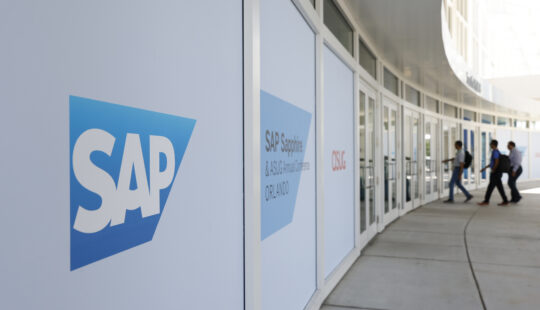Providing light to millions with recycled plastic bottles, water, and chlorine? It’s possible! Brilliant ideas often emerge from necessity or deeply personal experience – this is how many social enterprises start their businesses.
- The SAP Corporate Social Responsibility team is embarking on a refreshed strategy
In 2002, Brazilian engineer Alfredo Moser had a brilliant idea. Triggered by yet another blackout of the electricity system that plunged the area into darkness, he wanted to do something about it. After several attempts, Moser created a revolutionary light device by filling a 1.5-liter plastic bottle with water and 10 milliliters of chlorine. Skeptical about how it works? Check out this video.
Across Latin America, millions continue to live beyond the electricity grid. While only 46.9% of the population has access to electricity in Haiti, the number is significantly higher in countries like Honduras (93.2%) or Ecuador (98.8%). Electrical coverage is simply not a given everywhere. Therefore, it was no surprise that Moser’s idea was embraced by social entrepreneurs worldwide. This includes Colombia-based NGO Un Litro de Luz (One Liter of Light), which went on to help more than 237,000 people in eight countries light up their homes with glowing plastic bottles.
Social enterprises like One Liter of Light are impact-driven businesses established to achieve social and/or environmental objectives. They are on the rise for good reason. According to the European Commission, the social entrepreneurship sector employs around 40 million people and engages over 200 million volunteers globally. Compared to other companies, social entrepreneurs are not solely driven by the need to maximize profit for shareholders and owners. Instead, financial surpluses are principally reinvested to support their purpose-driven mission. From promoting quality education and tackling global inequalities to fostering climate protection, social entrepreneurs do it all through the power of business — and the market is taking note.
The force of sustainability is unfolding in finance too. The pressure from investors on companies is increasing. Businesses have started to understand that financial and social performance are no longer mutually exclusive, as demonstrated in the SAP Integrated Report 2021.
Companies can no longer look at business activities from a “do no harm” point of view; instead, they must create and integrate economic, social, and environmental impact. Today, over 6,000 publicly traded companies emphasize environmental, social, and governance (ESG) factors. Also, ESG funds see a record inflow from investors and account for 10% of worldwide fund assets.
Beyond the financials, global developments like climate change and mounting inequality are serious issues that all stakeholders in the global economy must face. In fact, The World Bank affirmed that the pandemic neutralized all gains made to alleviate poverty since 2017, deepening global inequalities. Moreover, the consequences of climate change often affect the poorest people in the world. The Intergovernmental Panel on Climate Change demands nothing less than a worldwide and economy-wide structural change in our behavior in its last report.
We must accept and respond to these realities, refocusing our actions as a company. To do so, the SAP Corporate Social Responsibility (SAP CSR) team is asking tough questions: Are we still on the right track? Is our CSR strategy aligned to the needs of both our business and the world?
To achieve meaningful and tangible results, I’m convinced that entrepreneurial thinking in social and ecological innovations must be combined.
“When corporations and social enterprises work together, they can change the world,” shared our peers at IKEA, Acumen, and Yunus Social Business. This is not only an aspiration — it demonstrates the power to create systemic change when organizations with different areas of expertise work together. For instance, at SAP, we enable thousands of employees to lend their expertise to help social enterprises address systemic, environmental, and business challenges through pro-bono consulting. We accelerate social business, and just as we do in partnership with our customers, accelerate their ability to help the world run better and improve people’s lives.
Recently, I had the pleasure to help launch the TRANSFORM Support Hub for employees together with Unilever and MovingWorlds. The hub is primed to be the global one-stop online shop for transforming business as a force for good through non-financial support for social entrepreneurs. It activates the public, social, and private sectors’ most important assets — their people, ecosystems, and supply chains — in service of people, planet, and profit. To offer an example, organizations like One Liter of Light can now seek streamlined, bespoke business coaching and pro-bono consulting from the Hub, among other services. With more than a decade of impact and experience in this space, we hope to connect thousands of SAP employees with social enterprises across the globe. Ultimately, unlocking new opportunities for social impact and leadership development at scale.
A recent study of nearly 1,000 young social entrepreneurs showed that more than 53% of their social enterprises focus on quality education. Why? Because these innovators understand what many still, don’t acknowledge: that education is the key to unlocking change. Education creates a ripple effect to solve many social and environmental issues far beyond economic growth. For instance, studies demonstrate additional investment in education can reduce carbon emissions. Farmers educated in field schools reduced their environmental impact by 39% and they decreased pesticide use by 17% while increasing their yield by 13% and revenue by 19%.
Innovation starts with all of us, so historically, the SAP CSR team has focused on education as a core tenant of our strategy. Last year, we revisited our approach, questioning what our education sweet spot truly was. What is an “education sweet spot,” exactly? In the vast education space, it is the opportunity where SAP can bring the most value by dedicating our core competencies. Our strategy is now clear. Simply put: we’ll build future skills to get more people into employment.
Reshaping our education investments to achieve this goal will be a challenging transformation. How will we do it?
We will wrap up and reshape our multi-stakeholder initiative with UNICEF and Generation Unlimited (GenU). After successfully reaching more than 2.9 million adolescents in the last two years, we will continue to equip and empower young people with the 21st century digital and life skills to make them ready for the job market.
There is no time to waste when more than 64 million unemployed youth and 145 million young workers worldwide live in poverty, according to the International Labor Organization. In 2022, we will build and reshape our global and regional programs to provide under-resourced youth training on soft skills, technical knowledge, and SAP software expertise. Take the program TechSaksham: in India, SAP partners with Microsoft to provide 62,000 young graduating women and 1,500 teachers with Industry 4.0 skills for careers in emerging technology by 2022.
As a responsible company, we must consider all of these issues. SAP has already demonstrated its holistic view of sustainability by incorporating social responsibility into its wider sustainability strategy. In the past year alone, we have engaged 20,000 employees who collectively have supported 2,000 social enterprises and nonprofit organizations reaching 7 million people across 94 countries. Read more about SAP’s impact over the last year in our 2021 SAP Corporate Social Responsibility eBook.
As we move forward together, we will tackle these issues strategically and innovatively to create equitable access to economic opportunity, education and employment, and the green economy.
Alexandra van der Ploeg is global head of Social Responsibility at SAP.
This article first appeared on the SAP News Center.



